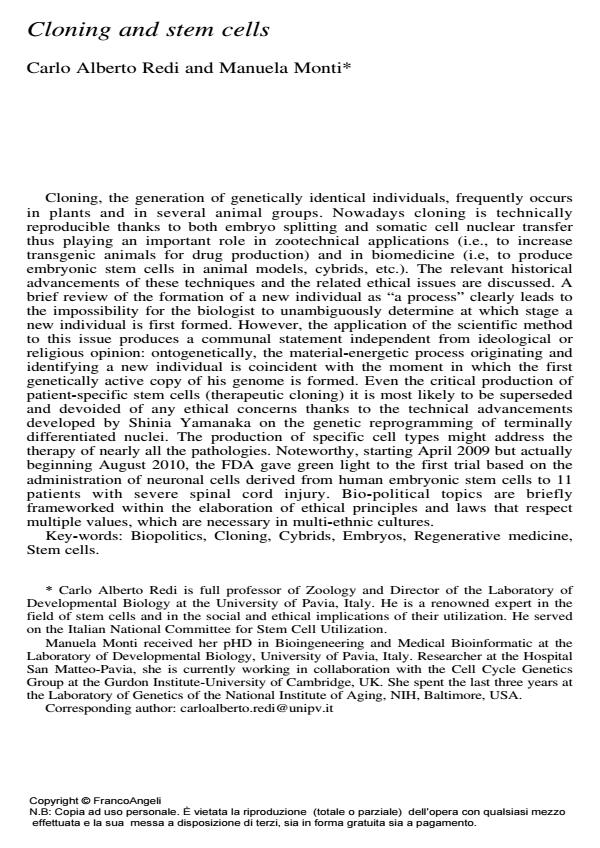Cloning and stem cells
Titolo Rivista SALUTE E SOCIETÀ
Autori/Curatori Carlo Alberto Redi, Manuela Monti
Anno di pubblicazione 2010 Fascicolo 2010/En3
Lingua Inglese Numero pagine 18 P. 73-90 Dimensione file 300 KB
DOI 10.3280/SES2010-003006-ing
Il DOI è il codice a barre della proprietà intellettuale: per saperne di più
clicca qui
Qui sotto puoi vedere in anteprima la prima pagina di questo articolo.
Se questo articolo ti interessa, lo puoi acquistare (e scaricare in formato pdf) seguendo le facili indicazioni per acquistare il download credit. Acquista Download Credits per scaricare questo Articolo in formato PDF

FrancoAngeli è membro della Publishers International Linking Association, Inc (PILA), associazione indipendente e non profit per facilitare (attraverso i servizi tecnologici implementati da CrossRef.org) l’accesso degli studiosi ai contenuti digitali nelle pubblicazioni professionali e scientifiche.
Cloning, the generation of genetically identical individuals, frequently occurs in plants and in several animal groups. Nowadays cloning is technically reproducible thanks to both embryo splitting and somatic cell nuclear transfer thus playing an important role in zootechnical applications (i.e., to increase transgenic animals for drug production) and in biomedicine (i.e, to produce embryonic stem cells in animal models, cybrids, etc.). The relevant historical advancements of these techniques and the related ethical issues are discussed. A brief review of the formation of a new individual as "a process" clearly leads to the impossibility for the biologist to unambiguously determine at which stage a new individual is first formed. However, the application of the scientific method to this issue produces a communal statement independent from ideological or religious opinion: ontogenetically, the material-energetic process originating and identifying a new individual is coincident with the moment in which the first genetically active copy of his genome is formed. Even the critical production of patient-specific stem cells (therapeutic cloning) it is most likely to be superseded and devoided of any ethical concerns thanks to the technical advancements developed by Shinia Yamanaka on the genetic reprogramming of terminally differentiated nuclei. The production of specific cell types might address the therapy of nearly all the pathologies. Noteworthy, starting April 2009 but actually beginning August 2010, the FDA gave green light to the first trial based on the administration of neuronal cells derived from human embryonic stem cells to 11 patients with severe spinal cord injury. Bio-political topics are briefly frameworked within the elaboration of ethical principles and laws that respect multiple values, which are necessary in multi-ethnic cultures.
Parole chiave:Biopolitics, Cloning, Cybrids, Embryos, Regenerative medicine, Stem cells
Carlo Alberto Redi, Manuela Monti, Cloning and stem cells in "SALUTE E SOCIETÀ" En3/2010, pp 73-90, DOI: 10.3280/SES2010-003006-ing